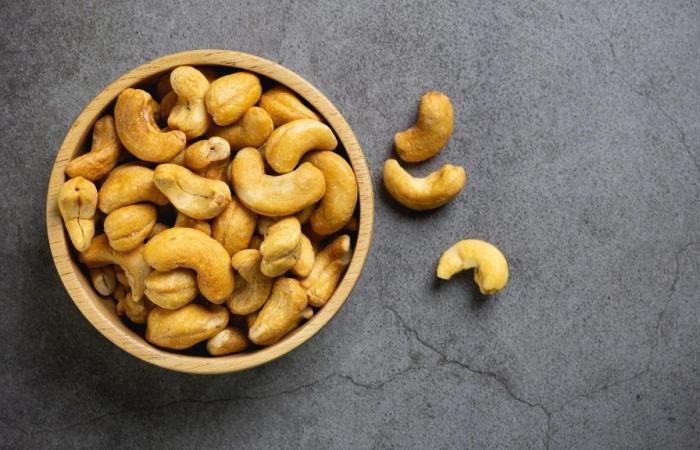Discover the nutritional benefits of cashew nuts, including their impact on health, caloric value and practical tips for integrating this superfood into your diet in a balanced and healthy way
Cashew nuts are an excellent complement to a healthy and balanced diet, offering a variety of benefits to human health. By including this food in your eating routine, with moderate consumption, you can take advantage of the different nutrients it contains and which are essential for supporting and improving various bodily functions.
To begin with, it’s good to know that cashew nuts are part of the oilseed group, which also includes, for example, peanuts, Brazil nuts and walnuts. These are foods that come from plants and should preferably be consumed fresh, that is, without the addition of sugar and salt.
According to the Food Guide for the Brazilian Population, from the Ministry of Health, oilseeds are minimally processed foods, which means that “have been subjected to cleaning processes, removal of inedible or undesirable parts, fractionation, grinding, drying, fermentation, pasteurization, refrigeration, freezing and similar processes“.
Find out more about cashew nuts:
What are the nutrients?
Cashew nuts can be part of a balanced diet and will bring benefits to the human body. This is because it has fiber, proteins, vitamin E and B complex, magnesium, zinc and copper.
For example, 100g of cashew nuts has 582 calories – around 25% of the recommended daily values -, 18.2g of proteins, 30.2g of carbohydrates and 3.30g of fiber, according to the Brazilian Composition Table of Food (TBCA).
Benefits of cashew nuts
With the nutrients mentioned above, this oilseed brings health benefits. For example, it acts to prevent aging due to the presence of antioxidants, which fight free radicals, and helps maintain eye health. Furthermore, the presence of zinc and vitamin E helps protect the brain, such as disease prevention and neurotransmitter care.
Magnesium and tryptophan are nutrients that stimulate the production of serotonin, which acts on mood, and is also an ally in combating depression. Meanwhile, protein is important for muscle health and cell repair.
In turn, fiber helps with the feeling of satiety and balance blood sugar and cholesterol levels.
How to consume cashew nuts
According to the Ministry of Health, cashew nuts are great for quick meals throughout the day. You can make a mix of cashew nuts with other oilseeds, such as Brazil nuts, walnuts, almonds, peanuts, and carry them in your bag to consume when you are hungry. Furthermore, it is also a good complement to natural yogurt or fruit.
Meanwhile, the Food Guide for the Brazilian Population, from the Ministry of Health says that chestnuts, walnuts, almonds and peanuts can be used in various dishes. For example, it can be part of the ingredients of salads, sauces, savory or sweet preparations. However, when they contain added salt or sugar, consumption should be limited.
It is recommended that the person eat around 5 units of cashew nuts per day to obtain the nutritional benefits.
Can children consume it?
According to the Food Guide for Brazilian Children Under 2 years of age, from the Ministry of Health, cashew nuts and other oilseeds can be part of children’s diets. This food brings benefits, as mentioned above, for any age, as long as consumption is not excessive.
However, parents and guardians must be careful about how they offer oilseeds to young children. This is because they can cause choking due to their format. So, ideally, they should be crushed or chopped before offering them to a child.
tags cashew nutscashew nuts benefits






